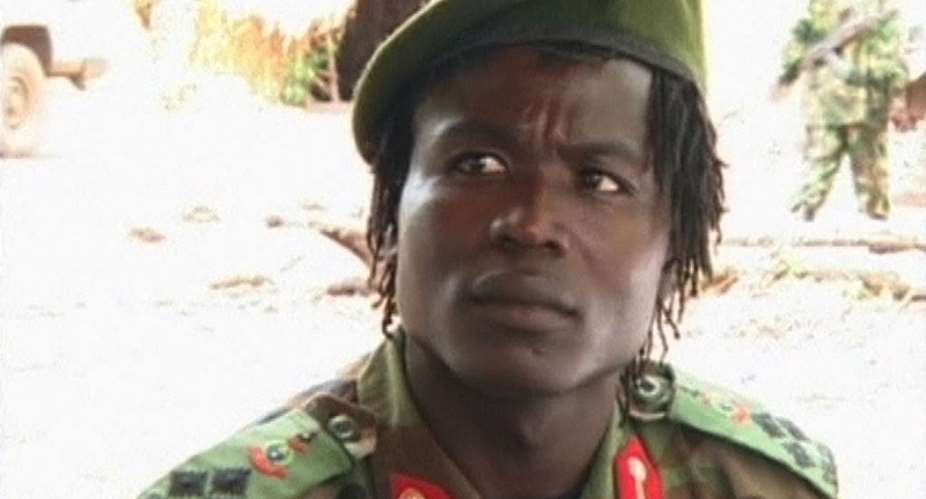The Hague, Mar. 12, GNA - The appearance of Dominic Ongwen before the International Criminal Court (ICC) in The Hague in January to answer to charges of crimes against humanity and war crimes allegedly committed in Uganda in 2004 was not as clear cut as it would appear.
Ongwen's case is a strange one. Abducted by the infamous Lord's Resistance Army (LRA) in 1990 when he was 10 years old, he is a victim of the rebels' violent campaign as well as a participant in the carnage in northern Uganda.
Under the clutches of the LRA, Ongwen rose to become second in command to the rebel army's leader, Joseph Kony.
When Ongwen appeared before ICC Judge Ekaterina Trendafilova on three counts of crimes against humanity and four counts of war crimes, he confirmed he was a senior member of the LRA.
He explained that he had been abducted at the age of 10 while on his way to school.
In the 30 years that the LRA has waged its vicious campaign in northern Uganda, it has been responsible for 100,000 deaths and the kidnap of 60,000 children.
During this period, the conflict has been extended to neighbouring countries.
Ongwen was captured in January in the Central African Republic (CAR) by Seleka rebels in that country and handed over the US Special Forces that have been aiding the Ugandan government in the fight against the LRA.
A confirmation of charges hearing to decide whether to send the case to trial will take place on August 24.
This is the crux of the matter. There are many, including a Ugandan Bishop, who feel that Ongwen should not face trial because he was a victim of the LRA that might have forced him to carry out the alleged atrocities.
Others disagree. The Women's Initiatives for Gender Justice welcomed Ongwen's arrest while Victor Ochen of the African Youth Initiative Network said that the previous status as a child soldier should not overshadow Ongwen's role as an LRA commander.
Researcher Valerie Arnoud has argued that the Ongwen case highlights the complex issues the ICC faces.
Arnoud, a Research Fellow at the School of Business and Law at the University of East London, noted: 'In the case of Ongwen, an added challenge for the Court is that while he is responsible for mass human rights violations, he is also himself a victim of the conflict as he was abducted by the LRA when he was 10 years old.
'International criminal justice has rarely dealt with situations where the lines between perpetration and victimhood are so blurred. So far, only the prosecutor of the Special Court for Sierra Leone has taken the express decision not to indict child soldiers because of their dual status as victim and perpetrator.
'Whether the ICC is likely to toe the same line in Ongwen's case is uncertain, in light of his high profile as a senior LRA commander and the fact that he is tried for crimes which he committed as an adult.
'Nevertheless, Ongwen's particular situation raises further challenges to how responsibility for wartime atrocities is understood and dealt with,' Arnoud added.
The ICC's Rome Statute does not provide jurisdiction over crimes committed by someone under 18, but Ongwen can be tried for the crimes he committed as an adult.
His status as a child abductee could be a mitigating factor during sentencing in the event of trial and conviction, and may also be relevant to his legal defence, say legal experts.
The arrest of Ongwen in the CAR dispelled claims by the Ugandan government that he was being harboured either in Sudan or South Sudan.
'In the wake of Ongwen's arrest, various statements by the African Union, the UN Security Council, the Seleka rebels and even a Ugandan army spokesman, have totally refuted the Ugandan allegations,' a Sudanese government official told the GNA.
In the meantime, the Seleka rebels are making a claim for the $5 million bounty that the US government had placed on the heads of senior LRA commanders, including Ongwen, for whom warrants of arrest had been issued by the ICC.
It is not likely, though, that the US will pay up to a rebel movement that has also committed serious crimes in the CAR.
GNA





 Akufo-Addo commissions Phase II of Kaleo solar power plant
Akufo-Addo commissions Phase II of Kaleo solar power plant
 NDC panics over Bawumia’s visit to Pope Francis
NDC panics over Bawumia’s visit to Pope Francis
 EC blasts Mahama over “false” claims on recruitment of Returning Officers
EC blasts Mahama over “false” claims on recruitment of Returning Officers
 Lands Minister gives ultimatum to Future Global Resources to revamp Prestea/Bogo...
Lands Minister gives ultimatum to Future Global Resources to revamp Prestea/Bogo...
 Wa Naa appeals to Akufo-Addo to audit state lands in Wa
Wa Naa appeals to Akufo-Addo to audit state lands in Wa
 Prof Opoku-Agyemang misunderstood Bawumia’s ‘driver mate’ analogy – Miracles Abo...
Prof Opoku-Agyemang misunderstood Bawumia’s ‘driver mate’ analogy – Miracles Abo...
 EU confident Ghana will not sign Anti-LGBTQI Bill
EU confident Ghana will not sign Anti-LGBTQI Bill
 Suspend implementation of Planting for Food and Jobs for 2024 - Stakeholders
Suspend implementation of Planting for Food and Jobs for 2024 - Stakeholders
 Tema West Municipal Assembly gets Ghana's First Female Aircraft Marshaller as ne...
Tema West Municipal Assembly gets Ghana's First Female Aircraft Marshaller as ne...
 Dumsor is affecting us double, release timetable – Disability Federation to ECG
Dumsor is affecting us double, release timetable – Disability Federation to ECG
